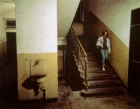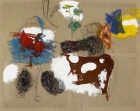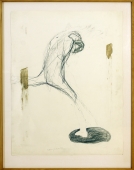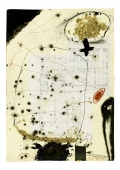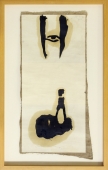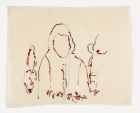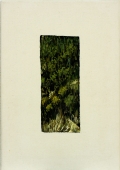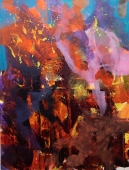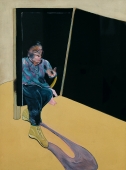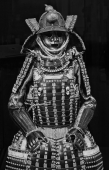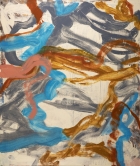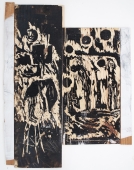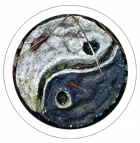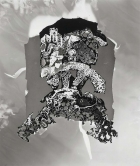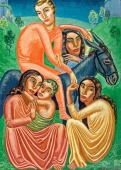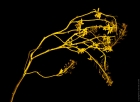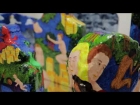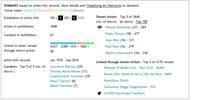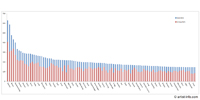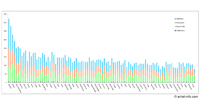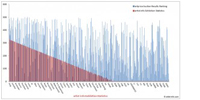
Artist | Jeff Wall (*1946)
https://www.artist-info.com/artist/Jeff-Wall
Biography
Biography
born in 1946
About the work
About the work
Odradek, Taboritskà 8, Prague, July 18, 1994
On July 18, 1994 Jeff Wall took the photograph in Taboritskà 8 in Prague which became the work Odradek. Like all of Jeff Wall’s artworks, Odradek is a Cibachrome, a kind of gigantic slide, placed in a light box, so that fluorescent bulbs instill the picture with luminous energy.
Why does Wall call the work Odradek? Franz Kafta, the German-speaking author born in Prague in 1883 wrote a short, concentrated story with the title The Cares of a Family Man , ("The Cares of a Family Man," in The Complete Stories, tr. Willa and Edwin Muir, London, 1971, pp. 427-9) in which he tells of Odradek. With the title of his picture Jeff Wall refers to this text by Kafta: „Some say the word Odradek is of Slavonic origin, and try to account for it on that basis. Other again believe it to be of German origin, only influenced by Slavonic. The uncertainty of both interpretations allows one to assume with justice that neither is accurate, especially as neither of them provides an intelligent meaning of the word. etc. ..."
In Jeff Wall’s picture, Odradek is to be found on the floor, in the space between the pillar and the staircase. And the fact that I have only now got round to talking about him is because you do not really see him. You have to point at him with a fingern and even then you sense his presence more than you actually see him.
Wilhelm Emrich, in his major Kafta biography written in 1958, dealt comprehensively with Kafta’s Odradek beschäftigt (Wilhelm Emrich, Franz Kafka, Das Baugesetz seiner Dichtung - Der mündige Mensch jenseits von Nihilismus und Tradition, Bonn 1958, pp 92). On the one hand, he writes that the word could derive from the German and contain: rad = advice, od = from, away from and -ek (both the latter being influenced by the Slavonic) = an expression for reduction. On the other, it could also be purely Slavonic in origin: a small being, that advises against something (German: ab-raten), an „Abrätchen“, a parodistic analogy to the German „Geheimrätchen“, a small „privy councilor“. However, Emrich believes that the Czech word „radost“ (delight) or the adjective „rad“ (meaning to please, to do something gladly) may be applicable for Kafka’s Odradek, not to mention the German word „Rad“, or „,wheel“, which would suggest itself given the „star-like" form of the spool that goes to make up Odradek. „The meaning of this small poetic being," writes Emrich, „is to suspend all delimiting meaning, to advise against everything."
„Odradek," Emrich continues, „does not participate therefore in the hunt of life and thought processes. He is immortal, detached from everything and therefore has ‘no fixed abode’. And the ‘cares of the family man’, the troubling feeling of someone who is responsible for an earthly domicile, consists precisely of the fact that in Odradek he recognizes the limits of all earthly existence, that here he is confronted by ‘a perfect whole’ which he cannot grasp with some human meaning and which will outlive him, hence the painful idea. So that retroactively now even his own human goals and purposes, which he has always tussled with, inevitably appear useless and senseless... Odradek is no longer a symbol for a meaningful intellectual construct ... Odradek is absolute freedom in the middle of the existence, no longer ‘to be captured’ or forced into the order of things or an intellectual system. The price for this is life, breath, and any goal oriented intentional will, which gives him the ‘semblance’ of having died out, of having been thrown away, of being old and useless."
So much for Emrich’s interpretation of Kafka’s Odradek. But what is the relation between Jeff Wall’s „enigmatic figure“, as Emrich terms Odradek, and the Kafka figure? If we take the family man’s cares seriously, then they consist in the fear that Odradek might outlive him, his children and his children’s children. This idea is „almost painful" for him. Let us date this family man to pre-war days, in which case he could be the great-grandfather of the girl coming down the stairs. She does not notice Odradek who is leading his miserable, if only momentary, existence next to the staircase. If he were to raise his voice, which sounds like the rustle of fallen leaves, the girl would probably hardly hear it.
With the voice of the Bohemian Jew Franz Kafka, the voice of Jews in general gradually ceases to be audible, as does the voice of those whose mother tongue in Central Europe was German. Through the voice of Kafka Odradek has, however, survived the Holocaust. The cares of the family man have proved to be valid. The house in which Odradek lingers has meanwhile become as dilapidated as he himself has always been. The young girl who came down the stairs an July 18, 1994 knows of nothing. But yet again? What do we know? (Kajka died on June 3, 1924, he was buried in Prague on June 11.)
The destruction of the Jews is an incomprehensible cultural shock. I believe that Jeff Wall addresses this. But I am not sure. Seen in the cold light of day, he merely wanted to place a parable or story in a photographic frame. But what meaning does the story have in the present age? From a Jewish viewpoint, Wall’s Odradek might bring to mind both the Diaspora and Galuth. While the Diaspora refers to a voluntary scattering, Galuth designates a violent exile, and is connected with Geullah, the notion of a point in time that brings redemption. Odradek would then be a being waiting persistently for redemption while, as it were, aimlessly straying through time and space, at home nowhere, because he has internalized his exile. From a general viewpoint, the work may address the homelessness modern, „exposed“ man. Odradek would then late to contemporary people the way nomadic timelessness relates to indefinite temporality. The cares of the family man cannot be shared by the young girl.
Jreff Wall'S Odradek articulates with great precision an immense feeling of sympathy, of sorrow and of despair.
Here, a Canadian artist from Vancouver, born in 1946, speaks to us, cautiously and urgently about something irretrievably lost, which he nevertheless pin-points in us. What we experience is the mysterious universe of our selves, which he gives timeless roots in us in the form of the „enigmatic figure“ of Odradek. Each of us contains an Odradek, whether we wish to accept his presence or not. In the days when the janitor was still called a ‘family man', he had an ear for Odradek, even if he did not concern himself greatly with the latter. The being nevertheless certainly caused him to pause and think. Odradek was unconsciously part of his responsibility, his being and existence. Odradek created the resonance within him which the voice of that fabled being did not possess. Each of us is „a family man“, caring for our own selves.
German text by Jean-Christophe Ammann / Translation by Jeremy Gaines
(Extract - Full printed version available in the Museum)
MMK - Museum für Moderne Kunst, Frankfurt am Main
Odradek, Taboritskà 8, Prag, 18. Juli 1994
Am 18. Juli 1994 hat Jeff Wall in der Taboritskà 8 in Prag die Aufnahme gemacht, die in der Folge zum Werk Odradek geführt hat. Wie alle Arbeiten von Jeff Wall handelt es sich um ein Cibachrome - eine Art gigantisches Diapositiv -, das sich in einem Leuchtkasten befindet. Fluoreszenzröhren verleihen dem Bild eine leuchtende Kraft.
Weshalb nennt Wall das Werk Odradek? Der deutschsprachige, 1883 in Prag geborene Dichter Franz Kafka hat in einer kurzen, dichten Erzählung, die den Titel Die Sorge des Hausvaters (Franz Kafka, Erzählungen, Frankfurt am Main 1946, S. 170-172) trägt, über Odradek berichtet. Jeff Wall bezieht sich mit seinem Bildtitel auf diesen Text von Kafka: „Die einen sagen, das Wort Odradek stamme aus dem Slawischen und sie suchen auf Grund dessen die Bildung des Wortes nachzuweisen. Andere wieder meinen, es stamme aus dem Deutschen, vom Slawischen sei es nur beeinflußt. Die Unsicherheit beider Deutungen aber läßt wohl mit Recht darauf schließen, daß keine zutrifft, zumal man auch mit keiner von ihnen einen Sinn des Wortes finden kann. etc. ..."
Auf dem Bild von Jeff Wall befindet sich Odradek auf dem Boden, im Zwischenbereich von Pfeiler und Treppe. Wenn ich erst jetzt auf ihn zu sprechen komme, so deshalb, weil man ihn eigentlich gar nicht sieht. Man muß schon mit dem Finger auf ihn zeigen, und auch dann ahnt man ihn mehr, als daß er zu erkennen wäre.
Wilhelm Emrich hat sich in seiner großen Kafka-Biographie aus dem Jahr 1958 ausführlich mit Kafkas Odradek beschäftigt (Wilhelm Emrich, Franz Kafka, Das Baugesetz seiner Dichtung - Der mündige Mensch jenseits von Nihilismus und Tradition, Bonn 1958, S. 92 ff). Zum einen schreibt er, könne das Wort aus dem Deutschen stammen und beinhalte: rad = Rat, od = ab, weg von und -ek (letztere beide slawisch beeinflußt) = Ausdruck von Verkleinerung. Zum anderen wäre aber auch eine rein slawische Bildung vorstellbar: Ein kleines Wesen, das abrät, ein „Abrätchen“, in parodistischer Analogie zu „Geheimrätchen“. Jedoch, meint Emrich, könne auch das tschechische Wort „radost“ (Freude) bzw. das Adjektiv „rad“ (gefällig sein, etwas gerne tun) für Kafkas Odradek verbindlich sein, nicht zuletzt das deutsche Wort „Rad“, was bei der „sternartigen“ Form der Zwirnspule, die Odradek kennzeichnet, naheliege. „Der Sinn dieses poetischen kleinen Wesens“, schreibt Emrich, „ist die Aufhebung jeglichen begrenzenden Sinns, das ‘Abraten’von allem.“
„Odradek“, schreibt Emrich weiter, „hat also nicht teil an der Jagd der Lebens- und Denkprozesse. Er ist unsterblich, allem entgegen, und hat daher einen ,unbestimmten Wohnsitz’. Und, die ‘Sorge des Hausvaters’, das beunruhigende Gefühl dessen, dem die Verantwortung für sein irdisches Haus auferlegt ist, besteht eben darin, daß er in Odradek die Grenze aller irdischen Existenz erkennt, daß ihm hier ein ,abgeschlossenes Ganzes’ entgegen tritt, das er mit keiner menschlichen Sinngebung zu erreichen vermag und das ihn selbst - darin besteht seine ,schmerzliche Vorstellung’ - überleben wird, so daß rückwirkend nun auch seine eigenen menschlichen Ziele und Zwecke, an denen er sich zerrieben hat, nutzlos und sinnlos erscheinen müssen... Odradek ist nicht mehr Symbol für sinnbestimmt Geistiges... Odradek ist absolute Freiheit mitten im Dasein, nicht mehr ’zu fangen’, in keine Ding- und Denkordnung mehr zu zwingen. Das ist möglich freilich nur unter Preisgabe des Lebens, des Atmens und jeder zielbestimmten Willensintension, was ihm den ‘Schein’ des Abgestorbenen, Weggeworfenen, Alten, Nutzlosen gibt.“
Soweit Emrichs Interpretation von Kafkas Odradek. Wie aber verhält sich jene von Jeff Wall zu dieser „Rätselfigur“ (Emrich)? Nimmt man die Sorge des Hausvaters beim Wort, so besteht sie darin, daß Odradek ihn, seine Kinder und Kindeskinder noch überleben könnte. Diese Vorstellung ist für ihn eine „fast schmerzliche“. Datieren wir den Hausvater in die Vorkriegszeit, dann könnte es der Urgroßvater jenes Mädchens sein, das die Treppe heruntersteigt. Es bemerkt den Odradek nicht, der neben der Treppe sein kümmerliches, wenn auch nur momentanes, Dasein fristet. Würde er seine Stimme erheben, die dem Rascheln im Laub gleicht, wird das Mädchen diese Stimme wohl kaum vernehmen.
Mit der Stimme des böhmischen Juden Franz Kafka erlischt zunehmend auch die Stimme der Juden allgemein und die Stimme jener, deren Sprache in Mitteleuropa die deutsche war. Odradek aber hat mit der Stimme von Kafka den Holocaust überlebt. Die Sorge des Hausvaters hat sich bewahrheitet. Das Haus, in dem Odradek sich aufhält, ist mittlerweile so vergammelt wie er selbst seit eh und je ist und war. Das junge Mädchen, das am 18. Juli 1994 die Treppe herunterkommt, weiß von nichts. Vielleicht doch? Was wissen wir? (Kafka starb am 3. Juni 1924, am 11. Juni wird er in Prag beigesetzt.)
Die Vernichtung der Juden ist ein nicht nachvollziehbarer Kulturschock. Ich glaube, daß Jeff Wall dies anspricht. Aber ich bin mir da nicht sicher. Nüchtern gesehen wollte er schlicht und einfach eine Parabel, eine Erzählung in ein Bild umsetzen. Aber was würde den Sinn des Werks aus unserer heutigen Zeit ergeben? Aus jüdischer Sicht könnte Wall’s Odradek Diaspora und Galuth gleichermaßen verbinden. Während Diaspora die freiwillige Zerstreuung bedeutet, meint Galuth die gewaltsame Verbannung, die im Zeitbegriff Gëulla die Erlösung anspricht. Odradek wäre dann ein der Erlösung harrendes, gleichsam ziellos streunendes Wesen in Zeit und Raum, das nirgends zu Hause ist, weil es seine Verbannung verinnerlicht hat. Aus allgemeiner Sicht könnte die Heimatlosigkeit des modernen, des „ausgelieferten“ Menschen angesprochen sein. Odradek würde sich dann zum heutigen Menschen wie die nomadische Zeitlosigkeit zur unbestimmten Zeitlichkeit verhalten. Die Sorge des Hausvaters kann das junge Mädchen nicht teilen.
Jeff Walls Qdradek artikuliert präzis ein immenses Gefühl der Sympathie, der Trauer und der Verzweiflung.
Ein Künstler aus Vancouver, Jahrgang 1946, spricht zu uns, behutsam und eindringlich von etwas Unwiederbringlichem, das er gleichzeitig positiv in uns festmacht, nämlich im mysteriösen Universum unseres Selbst, das er in der „Rätselfigur“ des Odradek zeitlos in uns verankert. Jeder von uns trägt Odradek in sich, ob wir ihn wahrhaben wollen oder nicht. Als der Hausmeister noch Hausvater hieß, hatte er ein Gehör für Odradek, auch wenn er sich nicht groß mit ihm einließ. Nachdenklich stimmte ihn das Wesen allemal. Odradek war unbewußt Teil seiner Verantwortung, seines Seins und Daseins. Odradek schuf die Resonanz in ihm, dem Hausvater, welche die Stimme des Fabelwesens nicht besaß. Jeder von uns ist „Hausvater“. „Hausvater“ des eigenen Selbst.
Text von Jean-Christophe Ammann
(Auszug - Der vollständige Text ist als Informationsblatt beim Museum erhältlich)
MMK - Museum für Moderne Kunst, Frankfurt am Main
Bibliography
Bibliography
Linsley, Robert/Auffermann, Verena: Jeff Wall. The Storyteller. Verlag Hassmüller, Frankfurt/M., 1992.
ISBN: 3-88270-467-5
 offers / Requests offers / Requests  |
About this service |
|---|
 Exhibition Announcements Exhibition Announcements  |
About this service |
|---|
 Visualization |
Learn more about this service | ||
|---|---|---|---|

Interested in discovering more of this artist's networks?
3 easy steps: Register, buy a package for a visualization, select the artist.
See examples how visualization looks like for an artist, a curator, or an exhibition place: Gallery, museum, non-profit place, or collector.

Exhibition History

|
SUMMARY based on artist-info records. More details and Visualizing Art Networks on demand. Venue types: Gallery / Museum / Non-Profit / Collector |
||||||||||||
| Exhibitions in artist-info | 171 (S 52/ G 119) |
Did show together with - Top 5 of 2053 artists (no. of shows) - all shows - Top 100
|
||||||||||
| Exhibitions by type | 171: 35 / 78 / 55 / 3 | |||||||||||
| Venues by type | 120: 21 / 51 / 45 / 3 | |||||||||||
| Curators | 71 | |||||||||||
| artist-info records | Jul 1970 - Nov 2024 | |||||||||||
|
Countries - Top 5 of 17 Germany (61) United States (31) Switzerland (17) France (7) United Kingdom (7) |
Cities - Top 5 of 72 New York (20) Frankfurt am Main (18) München (11) London (10) Berlin (9) |
Venues (no. of shows )
Top 5 of 120
|
||||||||||
Curators (no. of shows)
Top 5 of 71
|
| Kunstmuseum Luzern | G | Feb 2024 - Nov 2024 | Luzern | (521) | +1 | |
| Blättler, Alexandra (Curator) | +0 | |||||
| Tower - MMK | G | Mar 2018 - Jul 2018 | Frankfurt am Main | (10) | +0 | |
| Whitechapel Gallery | G | Jun 2017 - Sep 2017 | London | (417) | +0 | |
| Leopold-Hoesch-Museum | G | Dec 2015 - Feb 2016 | Düren | (84) | +0 | |
| Hal Bromm Gallery | G | Sep 2015 - Dec 2015 | New York | (72) | +0 | |
| Deutsche Bank Collection - Artists | S | Apr 2015 - Apr 2015 | Frankfurt am Main | (1) | +0 | |
| Keep reading |











